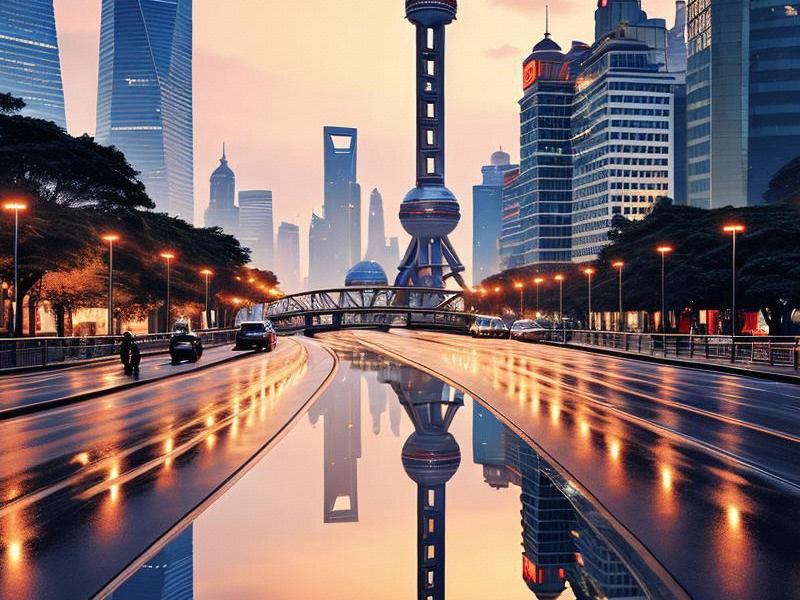
Shanghai, often referred to as the "Pearl of the Orient," is a city that seamlessly blends the old with the new. Its skyline, dominated by the iconic Oriental Pearl Tower and the futuristic Shanghai Tower, is a testament to the city's rapid urban development. Over the past few decades, Shanghai has transformed from a modest port city into one of the world's most dynamic metropolises.
The city's urban planning is a model of efficiency and sustainability. The Bund, a historic waterfront area, has been revitalized with modern skyscrapers, creating a stunning contrast between history and modernity. Pudong, once a rural area, has emerged as a financial hub, home to the Lujiazui Financial District and the Shanghai Stock Exchange.
Shanghai's transportation network is another highlight of its urban development. The city boasts an extensive metro system, efficient public buses, and a rapidly expanding high-speed rail network. The Hongqiao International Airport serves as a major gateway for both domestic and international travelers, connecting Shanghai to cities around the globe.
Innovation is at the heart of Shanghai's economic engine. The city has established itself as a global center for finance, technology, and trade. The Zhangjiang Hi-Tech Park is a hub for research and development, attracting top-tier companies and startups. Shanghai's government has implemented policies to foster a supportive environment for innovation, including tax incentives and funding for research initiatives.
夜上海最新论坛 The city's tech scene is booming, with companies like Ant Group and ByteDance making significant strides in the fintech and AI sectors. Shanghai's role in the digital economy is further enhanced by its participation in the Belt and Road Initiative, which aims to connect Asia, Africa, and Europe through infrastructure and trade projects.
Culturally, Shanghai is a melting pot of influences. The city's history as a trading port has left a lasting impact on its architecture, cuisine, and art. The French Concession, with its charming cobblestone streets and colonial-era buildings, is a popular tourist destination. The Yu Garden, a classical Chinese garden, offers a glimpse into the city's rich cultural heritage.
Shanghai's culinary scene is renowned for its diversity and innovation. From traditional Shanghainese dishes like xiaolongbao (soup dumplings) to modern fusion cuisine, the city offers something for every palate. The bustling night markets and high-end restaurants cater to a wide range of tastes, reflecting the city's cosmopolitan nature.
The arts scene in Shanghai is thriving, with numerous galleries, theaters, and music venues showcasing both traditional and contemporary works. The Shanghai Museum is a treasure trove of Chinese art, while the Shanghai Grand Theatre hosts world-class performances. The city's commitment to the arts is evident in its numerous cultural festivals and events, which attract visitors from around the world.
上海水磨外卖工作室 Shanghai's global influence is growing as it continues to position itself as a key player on the international stage. The city has hosted major international events, including the World Expo in 2010 and the APEC Summit in 2014. These events have showcased Shanghai's ability to host large-scale gatherings and its commitment to global cooperation.
The city's strategic location and robust infrastructure make it a hub for international trade and investment. Shanghai Port is one of the busiest ports in the world, handling a significant portion of China's maritime trade. The city's free trade zones and economic policies have attracted numerous multinational corporations, further solidifying its role as a global business center.
Shanghai's education system is another area of strength, with world-class universities and research institutions. Fudan University and Tongji University are among the most prestigious institutions in the country, attracting students and scholars from around the globe. The city's emphasis on education and innovation has contributed to its reputation as a knowledge-based economy.
上海喝茶群vx Despite its rapid development, Shanghai remains committed to sustainability and environmental protection. The city has implemented various initiatives to reduce pollution, promote green energy, and improve urban living conditions. The construction of eco-friendly buildings and the expansion of public transportation are part of Shanghai's efforts to crteeaa more sustainable future.
The city's residents enjoy a high quality of life, with access to world-class healthcare, education, and cultural amenities. Shanghai's government continues to invest in public services and infrastructure to ensure the well-being of its citizens. The city's vibrant community life and inclusive culture make it a desirable place to live and work.
Shanghai's role in global governance and diplomacy is also noteworthy. The city is home to numerous international organizations and serves as a platform for dialogue and cooperation. Shanghai's leadership in addressing global challenges, such as climate change and economic inequality, reflects its commitment to making a positive impact on the world.
In conclusion, Shanghai is a city that embodies the spirit of China's modernization and internationalization. Its rapid urban development, thriving innovation ecosystem, rich cultural heritage, and growing global influence make it a fascinating subject of study and admiration. As Shanghai continues to evolve, it remains a beacon of progress and a symbol of China's aspirations for the future.
